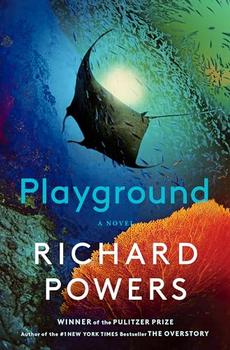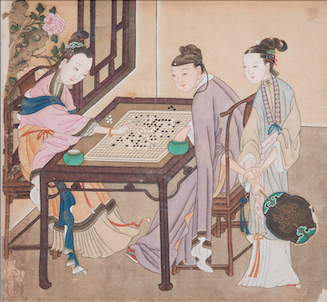Summary | Excerpt | Reading Guide | Reviews | Beyond the Book | Read-Alikes | Genres & Themes | Author Bio

A Novel
by Richard PowersThis article relates to Playground
In Richard Powers' novel Playground, best friends Todd and Rafi become obsessed with the board game Go (often capitalized in English to differentiate it from the common verb), and the pastime plays a large role in the narrative. According to the National Go Center, "Beyond being merely a game, Go can take on other meanings to its devotees: an analogy for life, an intense meditation, a mirror of one's personality, [an] exercise in abstract reasoning, a mental 'workout' or, when played well, a beautiful art in which black and white dance in delicate balance across the board."
 Outwardly, Go is a relatively simple game that even young children can learn, although its endless permutations mean one might never master it. It's played on a square wooden board (known as a goban) with a 19x19 grid carved into its surface. Each of the two players is given white or black go-ishi—flat, round stones—which they place one at a time, taking turns, where the horizontal and vertical lines intersect. Once a stone is placed, it can't be moved unless captured by one's opponent, which is done by surrounding it with one's own stones (in fact, the Chinese word for the game, wei-chi, translates into "surrounding game").
Outwardly, Go is a relatively simple game that even young children can learn, although its endless permutations mean one might never master it. It's played on a square wooden board (known as a goban) with a 19x19 grid carved into its surface. Each of the two players is given white or black go-ishi—flat, round stones—which they place one at a time, taking turns, where the horizontal and vertical lines intersect. Once a stone is placed, it can't be moved unless captured by one's opponent, which is done by surrounding it with one's own stones (in fact, the Chinese word for the game, wei-chi, translates into "surrounding game").
Go has been compared to chess, but according to the Association for Asian Studies, "while chess is a pitched battle of two 'armies,' Go is a competition between two 'colonizing forces.' …A chess game is lost when one army is destroyed; a Go game is won when one colony ends up controlling more territory. In short, the chessboard is a battlefield, but the Go board is a world."
Go is considered the oldest game in the world still played in its original form, and it's believed to have originated in China some 4000 years ago. How the game was invented is unknown. Some historians speculate that, with its ten points radiating from the board's center and its use of stones, it was the precursor to the abacus; others hypothesize that it may have originated as a fortune telling device. Its first unambiguous mention is in the Shiben, an early Chinese encyclopedia, which credits the invention of the game to the Emperor Yao, who supposedly created it to teach his rebellious son Dan Zhu discipline. (Many doubt this attribution.)
Go then spread to other Asian countries, particularly Japan, through trade. It's mentioned peripherally in The Tale of the Genji, which means it has been played in Japan since at least 1000 CE. The game's popularity really took off in 1602, though, when the Shogun Tokugawa established four schools specifically to teach it and compete against each other. When the Shogunate collapsed in 1868, Go lost most of its status, but its popularity was revived in 1920 when the Japanese Go Association was formed and Japan newspapers started sponsoring tournaments.
Go spread to Europe and the United States around the turn of the 20th century, but it never gained the level of popularity seen in Asian nations. Today, it's played by some 50 million people in China, Japan, South Korea, and Taiwan, with many others who don't play but follow it with keen interest. Go champions are considered major celebrities in these countries, and tournaments are common (the World Ing Cup, held every four years, offers one million USD in cash prizes).
Until recently, no computer could beat a human Go master. This changed in 2016, when an AI named AlphaGo, created by London-based DeepMind Technologies, beat Lee Sedol, one of the best human players in the world. AlphaGo won four of the five games in the series. An award-winning documentary about the match was made.
Filed under Places, Cultures & Identities
![]() This article relates to Playground.
It first ran in the October 2, 2024
issue of BookBrowse Recommends.
This article relates to Playground.
It first ran in the October 2, 2024
issue of BookBrowse Recommends.
They say that in the end truth will triumph, but it's a lie.
Click Here to find out who said this, as well as discovering other famous literary quotes!
Your guide toexceptional books
BookBrowse seeks out and recommends the best in contemporary fiction and nonfiction—books that not only engage and entertain but also deepen our understanding of ourselves and the world around us.